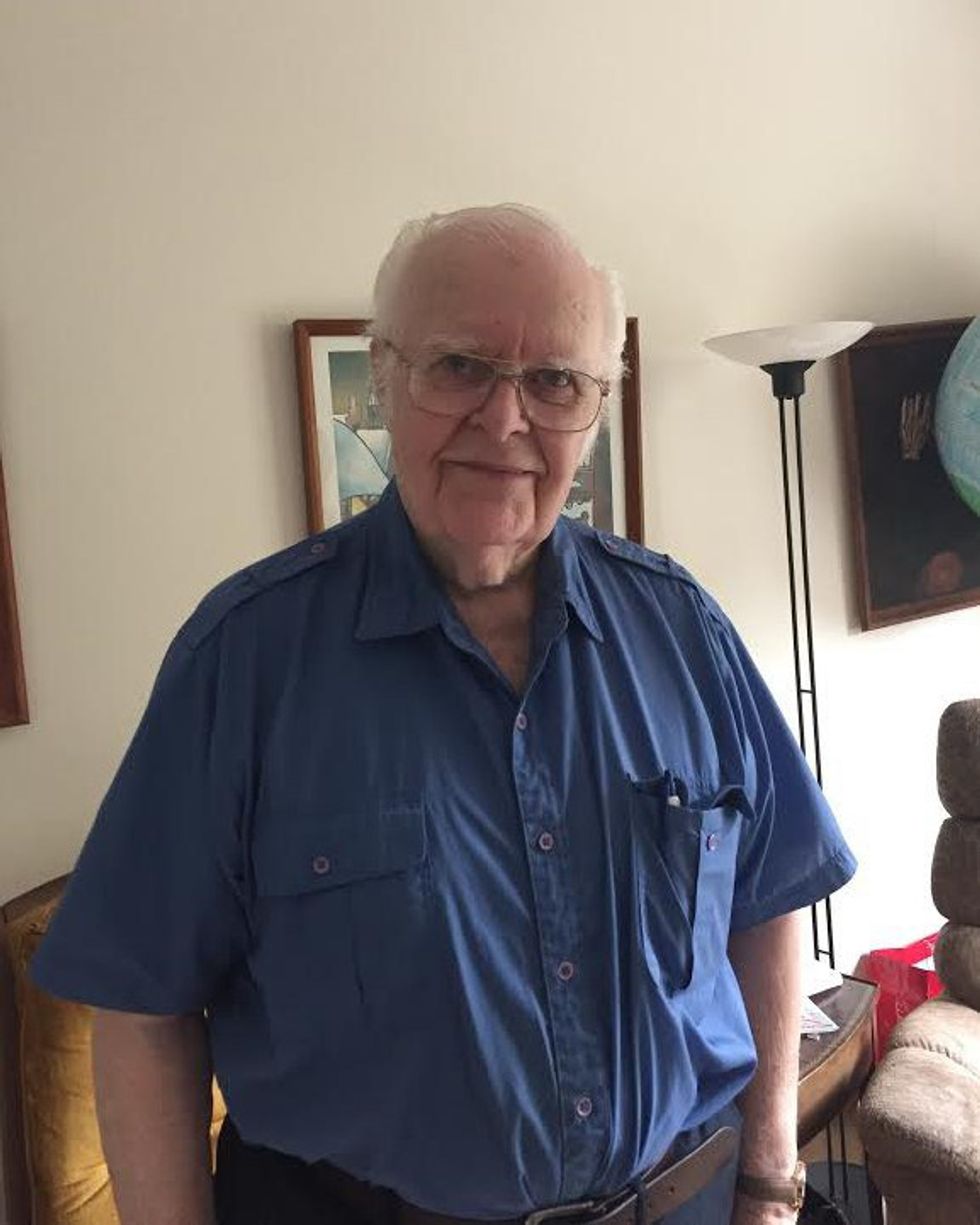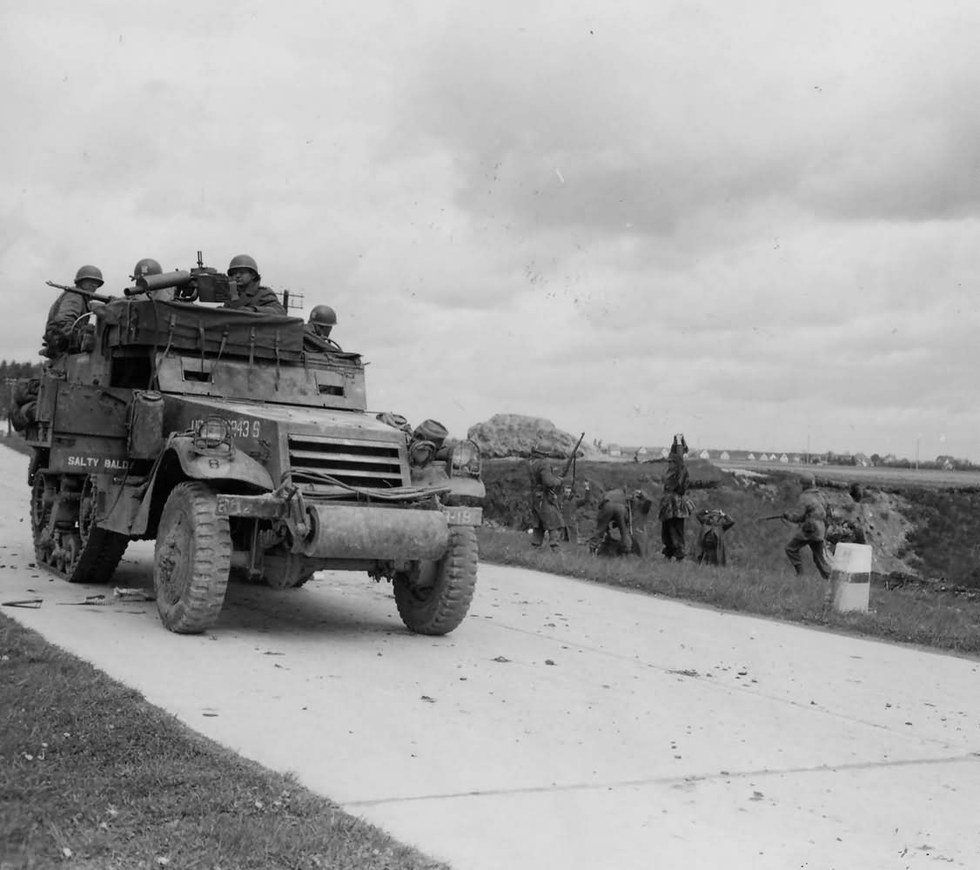This semester I enrolled in a Holocaust Seminar. Of course, I had learned about the Holocaust before; I associated Holocaust with Hitler, destruction, death. But it wasn't until this course that my eyes were really opened to the extent of atrocities that occurred. Yes, we learned about the rise of the Nazis, the camps and ghettos, and the Nuremberg Trials. The thing that made this seminar truly life changing, however, was not seeing the pictures of the hundreds of bodies deep in the trenches, imagining what the mother of the child shot dead was feeling. Or learning about the miracle stories some survivors had, such as surviving because of the music an individual played. Learning about those things made the experiences more real and ironically more unbelievable. Yet what was most life changing for me was hearing the firsthand accounts of Reverend Elbridge T. Holland, a soldier in World War II who took part in the liberation of Dachau.
My professor assigned the project the first week of class; we had to interview a survivor, discover their story. My classmate, Paul Maitner, and I didn't know what to expect. We struggled finding a Holocaust survivor of any degree, and when we decided to interview a liberator, we both thought it would be an interesting perspective.
The conversation started out slow; Reverend Holland spoke of his childhood and education as a teenager. When he said, “April 30th, 1945 was really the worst day of my life”, I knew the atmosphere of the room had changed dramatically. The day this soldier liberated the camp of Dachau was difficult for Paul and I to hear about and it seemed difficult for him to talk about as well. However, he wanted to share his story and felt it necessary for the Holocaust and its stories to continue to be spread.
Reverend Holland volunteered for the army in his second semester at college. He became part of the 20th Armored Division, where he was a corporal in the G1 section: the personnel section. Corporal Holland eventually had the job of driving a jeep to keep tabs on the other troops. By the end of April, 1945, G1 had made it to Munich, about 60 miles from Salzberg and 10 miles from Dachau. At this point, the German army was disintegrating. On April 29th, Corporal Holland was told by his Colonel that if the members of G1 were to do the rounds the following day, they should go through Dachau to see nothing like they had ever seen before. The following morning at 8:00a.m., Corporal Holland and a fellow soldier entered Dachau.
"As we got close to the camp, we began to see highly emaciated persons on the roads, leaving the camp . . . as we went along the main street, there were groups of 60-100 prisoners. The formations were 10 wide, 10 deep, and they marching, singing: it was liberation day," said Reverend Holland. "They were just walking skeletons. Most weighed 70-75 pounds. How they had strength enough to march and sing at the same time, I really don't know," Reverend Holland says.
"We walked along the main street and the first thing you saw was this long row of prisoners garb. I won't call them uniforms because I don't think they deserve the name of a uniform . . .There was this row of clothes 50-60 feet long, 5 feet high, just piled. and that's how many prisoners had shed their clothes before they were sent to the gas chambers and to the crematorium," he continued, "They say the gas chamber was never used as such in Dachau but this gas chamber, the floor, the whole are was covered with bodies, and it was probably three feet deep. And the smell was terrible. I held my breath longer than I had ever held it in my life.
"The crematorium was still going full force because they had to get rid of these bodies. A Polish man opened the door so we could see. We saw the bodies burning. This was a very difficult thing for us, I wondered if I could drive my jeep. I was so shaken up by this."
Reverend Holland continued to tell Paul and I of the SS officers pretending to be prisoners to escape punishment but being recognizable as officers because they weighed more than 70 pounds. He told of his experience visiting Hitler's baby farms. This was a place where women of ideal characteristics (blonde hair, blue eyes), bred and raised children of the same ideologies. Reverend Holland recalled the baby farms as "one of the craziest, most immoral ideas Hitler ever had." He displayed similar emotions as he recalled the inhumane actions of the Nazis during his interview.
Our interview consisted of similar stories of his experience walking through Dachau. He told us that after the war, he returned on multiple occasions. Although they made museums, Reverend Holland said that no one will ever get the full experience unless they were actually there. They will not smell the smells or see the sights he (or anyone there) did. It isn't the same. His experience liberating Dachau changed him; it made him more sure of his path to become a minister. He knew that this was God's intentions for him, and he was exactly where he needed to be, sharing his story and spreading love. Although his story was difficult to listen to at times, the interview immensely impacted both Paul and I.
Paul said, "The story he had to share was remarkably eye opening. During the interview, I could hear the emotion in his words and could imagine myself in his shoes, walking through the remains of what the Nazi soldiers had done. The atmosphere of the camp, from the liberated prisoners singing and celebrating, to the remains of everyday people being erased from existence through means of fire, is truly unbelievable. Words cannot describe the thoughts and feelings I had listening to his story."
Hearing Reverend Holland's story was humbling. Taking the Holocaust Seminar was beneficial, but not as eye-opening as listening to a first hand account of these dehumanizing activities. It is still hard to believe because of just how horrible it was. I have gained a new-found gratitude toward the freedom I have. Although Reverend Holland does not consider himself a liberator, in my eyes and many others, he is one. He continues to share his story whenever possible, and reminds us that these events did happen. To pay respect to the lives lost, stories such as this one should never be forgotten.
In the words of my classmate and friend, Paul, "The Holocaust happened, and remembering all those who suffered remains of high importance. It remains important that we share these stories while also caring for people and showing them the respect they deserve."
Thank you, Reverend Elbridge T. Holland, for your story and service.






















